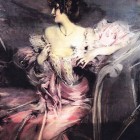Demimondaine 2016Sound
Read more about the opera Demimondaine
Launched as part of the annual Sound Festival of new music in Aberdeen, Demimondaine is a short (40 minute) piece for four singers and chamber ensemble. This first run consisted of two concert performances - a Friday evening followed by a Saturday afternoon.
The plot transports us to Paris of the Belle Epoque. An artist, Boldini, persuades a courtesan, Madame de Florian, to sit for him. He just fancies her, while she is attracted by the idea of the immortality the painting may provide for her. The series of almost philosophical discourses, as seduction proceeds in parallel with art, to mutual satisfaction, is framed by scenes set in the same apartment fifty years later. Just as the Germans are about to invade Paris, the courtesan's granddaughter and her boyfriend visit the apartment to take one last look at the portrait, which, to this point, at least, has provided her granny with the sought-for immortality.
This interesting idea provided an enjoyable entertainment in the perhaps surprising milieu of St Andrew's Episcopal Cathedral. This building has a fine, generous acoustic which really benefited all the instrumentalists. The composer conducted the work himself, and brought out lots of enjoyable detail from his players - string quintet (2 violins, viola, cello, bass); wind quartet (flute, oboe, clarinet, bassoon); piano and two percussionists (the fascinating combination of vibraphone and bass drum).
There is no doubt that Hudson writes effectively for each of those instruments, and as conductor he was highly successful in bringing out the interesting sound combinations, including the apparent incongruity of the drum. It all sounded excellent.
The writing for voices also seemed well composed, and each of the soloists had several opportunities. Catriona Clark, in the title role, had by far the longest and most demanding solo, as she recounted the grisly death of the great dancer Emma Livry, incinerated on stage before the eyes of her audience. The other three also seized their opportunities, and, in the context of the concert presentation, projected some sense of character.
The major reservation about the presentation was the difficulty all the singers had in projecting words. It may just be that vocalists, having studied their parts quickly, were naturally more intent on projecting that music. There may have simply been a problem resulting from the resonant cathedral acoustic - lovely for the instruments as it was. However the opera did have a very wordy libretto, and there was a lot of information crammed into the time available.
In all this was a highly praiseworthy effort, and as always with new music, it would be good to have an opportunity to hear it again.
Tickets £10 (£5 conc). Students FREE.
Performance Cast
- Solange Beaugiron Marthe de Florian's granddaughter
- Armand a friend of Solange
- Madame Marthe de Florian a courtesan
- Giovanni Boldini a painter
